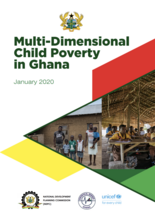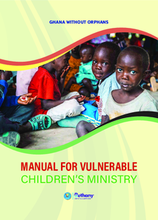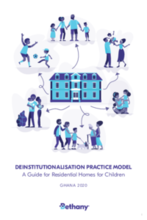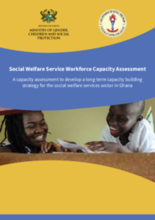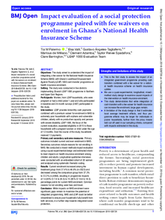Effective
NO SOURCE GIVEN
Social Welfare Spending
NO SOURCE GIVEN
i
Local Ordinance Order No. 66 mandates the Department of Social Welfare under the Ministry of Gender, Children and Social Protection (MoGCSP) as the responsible agency to regulate and coordinate alternative care in Ghana. Guided by the 1992 Constitution of Ghana, the Children’s Amendment Act (2016), and the Child and Family Policy, the Department of Social Welfare and its abled workforce has set in place mechanisms and programs to prevent and protect children from abuse, neglect and exploitation. Additionally, specific legislative instruments (LIs) have targeted different reforms in the department including the foster care LI (2018) 2361, Adoption Regulation (2018) LI 2360, the Social Protection Policy, and the Justice for Children Policy. The Department of Social Welfare is responsible for coordinating all activities and stakeholders involved in childcare reform including the regional and district offices. Following the approval of the Local Government Service Act 2003 and the LI 1961, the district and regional offices now report directly to the Metropolitan, Municipal and District Assemblies (MMDAs) and the Regional Coordinating Councils (RCCs) respectively. The Government of Ghana through the MOGSCP is the primary funding source of the Ministry of Gender and Social Protection and the Department of Social Welfare’s work. Following the recent development of the National Medium-Term Development Policy Framework (NMTDPF) by the MoGSC, 97.1% (US$ 129,297,418.39) of the total budget has been budgeted for provision of social services including alternative care, 92% of which goes directly to disbursements under the LEAP and the Ghana School Feeding Program (GSFP). Donors and development partners have also played an essential role in financing alternative care activities including reforms. Of the budget targeted by the MoGSC via the NMTDPF, donors contribute 4.2% mainly in the areas of social protection (86.7%), social services (10%) and domestic violence and child trafficking (5%). Social Protection, social services and securing inclusion for disability fall into a broader subsection of social development which takes 97% of the entire budget of the MoGSCP. Major donors in the space include USAID, World Bank and UNICEF.
Alternative Care Policy in Line with the 2009 Guidelines
Child and Family Welfare Policy. UNICEF, Government of Ghana, 2017
i
Child and Family Welfare Policy emphasizes alternative care along with the 2009 Alternative Care Guidelines. Regulations have been adopted on Adoption and Foster care. Amendments to the Children's Act have been approved that strengthen family-based care.
Centralised Authority on Adoption
Central Adoption Authority, Intersectoral Adoption Board
i
- Amended part IV (foster care and adoption) and consequential provisions of the Children’s Act, 1998, (Act 560) by the enactment of the Children’s (Amendment) Act, 2016 Acct 937 with additional safeguards that conform to the Articles of The Hague Convention.
- Ghana acceded to the 1993 Hague Convention on Protection of Children and Co-operation in Respect of Intercountry Adoption which came into force on January 1st 2017.
- Establishment of the Central Adoption Authority in 2017 and inauguration of the Intersectoral Adoption Board to co-ordinate adoptions in Ghana, collaborate and co-operate with Central Authorities abroad in administering intercountry adoption among other functions imposed on it by The Hague Convention.
- Adoption Regulations came into effect on Friday 27 July 2018 to regulate adoption in Ghana and the accreditation of adoption agencies.
Commitment to Deinstitutionalistion
Guidelines for Deinstitutionalisation of Residential Homes for Children. Department of Social Welfare, UNICEF, 2020
i
In 2017, DSW developed a five-year roadmap for the deinstitutionalisation of children that aims to close sub-standard residential care facilities and placed more children in foster care. In 2020, DSW developed deinstitutionalisation guidelines to assist the facilities to shift their activities to community and family strengthening.
Comprehensive Child Protection Law
Children's Act 1998, (560) amended in 2016 to include foster care and adoption
Continuum of Alternative Care Services Available
NO SOURCE GIVEN
Data System
Social Welfare Information Management System (SWIMS)
i
DSW developed a system to collect data of children in formal system care (Manual for Routine Monitoring. Government of Ghana, UNICEF, USAID, Measure Evaluation, 2019) but is not effective and not able to generate regular reliable data. The MoGCSP developed and is rolling out a Social Welfare Information Management System (SWIMS) which is a case management IMS that is able to generate data of children handled by case workers including children in different care arrangement. SWIMS is being piloted and will be scaled up to 260 districts by 2023.
Existence of a Regulatory Body and Regulatory System
Children’s Act, 1998, (Act 560), Foster Care Regulation (2018), Adoption Regulation (2018).
Gatekeeping Mechanism/Policy
Children in Need of Care and Protection: Standard Operating Procedures. Government of Ghana, 2018
i
DSW developed Case Management Standard Operating Procedures for children in need of care and protection include gatekeeping mechanisms. Gatekeeping is primarily coordinated by the district social worker who ensures children are directed into the appropriate care. In line with the CRI, district social welfare officers aim to direct children to family-based care. Not so many people know about the official gatekeeping procedures, as such, informal players have over time, played a critical role in deciding the form of care a child receives. These informal actors more often than not, ignore the official procedures and process. For example, a policeman who finds a child roaming, instead of taking the child to the District Social Welfare Officer, they will show up in a care home with the child and expect the care home owners to take the child. For most social welfare officers, this situation creates another challenge where children are unregistered with the district, resulting in no follow up of children placed in alternative care.
Means of Tracking Progress with Reforms
DSW, 2018
i
In 2018, DSW with stakeholders conducted an assessment of the alternative care system and developed an action plan to guide the reform
Moratorium on Admission into Institutions for Children Under 3
NO SOURCE GIVEN
Moratorium on New Institutions
NO SOURCE GIVEN
National Action Plan to Guide Reforms
DSW, 2020
i
Since 2007, GoG launched the Care Reform Initiative which is still ongoing. In 2018, DSW with stakeholders conducted an assessment of the alternative care system and developed an action plan to guide the reform
National Standards of Care
National Standards for Residential Homes for Children in Ghana. Government of Ghana, UNICEF, 2018; National Standards for Foster Care in Ghana. UNICEF, Department of Social Welfare, 2020
i
In 2018, DSW revised the National Standards for Residential Care. In 2020, DSW developed National Standards for Foster Care in Ghana
Prevention of Separation Services Available
NO SOURCE GIVEN
i
The strategic plan of the DSW aims to link the poorest families at risk of separation to the LEAP. Yet, a clear operational plan to implement this at the district level is lacking. Furthermore, for families that live slightly above the poverty line (US$ 3.2 or 18.7 Ghana Cedis) but with an increased risk of separation, LEAP is not an option. The eleventh objective of the care reform initiative reinforces the idea of linkage of vulnerable families to the LEAP; The objective reads, ‘Provide Fund for care and support packages that enable children to remain with their families established’. Nonetheless, like the strategic plan, there is no actionable blueprint for implementation. The criteria for selecting households for enrollment unto the LEAP includes a dimension of orphans and vulnerable children. This however excludes children at risk of becoming social orphans, the majority of who without any intervention will land in alternative care especially residential homes.
Support for Careleavers (in Legislation and in Practice)
DSW
i
In practice, children are supported to be reunified to their family and reintegrated to the community.

